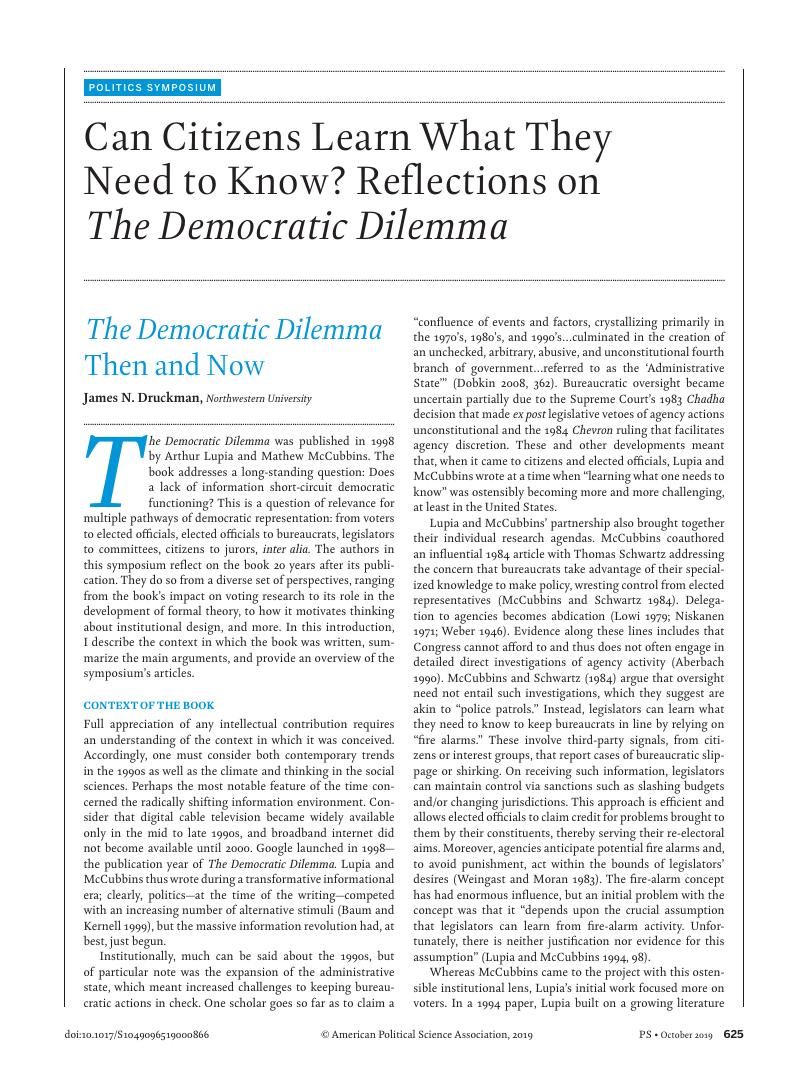No CrossRef data available.
Article contents
The Democratic Dilemma Then and Now
Published online by Cambridge University Press: 08 July 2019
Abstract
An abstract is not available for this content so a preview has been provided. Please use the Get access link above for information on how to access this content.

- Type
- Symposium: Can Citizens Learn What They Need to Know? Reflections on The Democratic Dilemma
- Information
- Copyright
- Copyright © American Political Science Association 2019
References
REFERENCES
Aberbach, Joel D. 1990. Keeping a Watchful Eye: The Politics of Congressional Oversight. Washington, DC: Brookings Institution Press.Google Scholar
Austen-Smith, David. 1999. “Arthur Lupia and Mathew D. McCubbins, The Democratic Dilemma: Can Citizens Learn What They Need to Know?” Public Choice 101: 147–56.CrossRefGoogle Scholar
Baum, Matthew A., and Kernell, Samuel. 1999. “Has Cable Ended the Golden Age of Presidential Television?” American Political Science Review 93: 99–114.CrossRefGoogle Scholar
Beck, Nathaniel, and Katz, Jonathan N.. 1995. “What to Do (and Not to Do) with Time-Series Cross-Section Data.” American Political Science Review 89: 634–47.CrossRefGoogle Scholar
Churchland, Paul M. 1995. The Engine of Reason, the Seat of the Soul: A Philosophical Journey into the Brain. Cambridge, MA: MIT Press.Google Scholar
Cox, Gary W. 1997. Making Votes Count: Strategic Coordination in the World’s Electoral Systems. New York: Cambridge University Press.CrossRefGoogle Scholar
Crawford, Vincent P., and Sobel, Joel. 1982. “Strategic Information Transmission.” Econometrica 50: 1431–51.CrossRefGoogle Scholar
Dobkin, Donald S. 2008. “The Rise of the Administrative State: A Prescription for Lawlessness.” Kansas Journal of Law & Public Policy 17: 362–85.Google Scholar
Druckman, James N., Green, Donald P., Kuklinski, James H., and Lupia, Arthur. 2006. “The Growth and Development of Experimental Research in Political Science.” American Political Science Review 100: 627–35.CrossRefGoogle Scholar
Gerber, Elisabeth R. 1999. The Populist Paradox: Interest Group Influence and the Promise of Direct Legislation. Princeton, NJ: Princeton University Press.Google Scholar
Green, Donald P., and Shapiro, Ian. 1994. Pathologies of Rational Choice Theory: A Critique of Applications in Political Science. New Haven, CT: Yale University Press.Google Scholar
Holland, John H., Holyoak, Keith J., Nisbett, Richard E., and Thagard, Paul R.. 1986. Induction: Processes of Inference, Learning, and Discovery. Cambridge, MA: MIT Press.Google Scholar
Kernell, Samuel, and Jacobson, Gary C.. 1999. The Logic of American Politics. Washington, DC: CQ Press.Google Scholar
Kuklinski, James H., Metlay, Daniel S., and Kay, W. D.. 1982. “Citizen Knowledge and Choices on the Complex Issue of Nuclear Energy.” American Journal of Political Science 26: 615–42.CrossRefGoogle Scholar
Lijphart, Arend. 1999. Patterns of Democracy: Government Forms and Performance in Thirty-Six Countries. New Haven, CT: Yale University Press.Google Scholar
Lowi, Theodore J. 1979. The End of Liberalism: The Second Republic of the United States. New York: W. W. Norton & Company.Google Scholar
Lupia, Arthur. 1992. “Busy Voters, Agenda Control and the Power of Information.” American Political Science Review 86: 390–404.CrossRefGoogle Scholar
Lupia, Arthur. 1994. “Shortcuts Versus Encyclopedias: Information and Voting Behavior in California Insurance Reform Elections.” American Political Science Review 88: 63–76.CrossRefGoogle Scholar
Lupia, Arthur, McCubbins, Mathew D., and Popkin, Samuel L., eds. 2000. Elements of Reason: Understanding and Expanding the Limits of Political Rationality. New York: Cambridge University Press.CrossRefGoogle Scholar
Lupia, Arthur, and McCubbins, Mathew D.. 1994. “Learning from Oversight: Fire Alarms and Police Patrols Reconstructed.” Journal of Law, Economics and Organization 10: 96–125.CrossRefGoogle Scholar
Lupia, Arthur, and McCubbins, Mathew D.. 1998. The Democratic Dilemma: Can Citizens Learn What They Need to Know? New York: Cambridge University Press.Google Scholar
Lupia, Arthur, and McCubbins, Mathew D.. 2001. “A Response to Austen-Smith.” Public Choice 106: 183–89.CrossRefGoogle Scholar
Lupia, Arthur, and Strøm, Kaare. 1995. “Coalition Termination and the Strategic Timing of Parliamentary Elections.” American Political Science Review 89: 648–65.CrossRefGoogle Scholar
McCubbins, Mathew D., and Schwartz, Thomas. 1984. “Congressional Oversight Overlooked: Police Patrols Versus Fire Alarms.” American Journal of Political Science 28: 165–79.CrossRefGoogle Scholar
Niskanen, William A. 1971. Bureaucracy and Representative Government. Chicago: Aldine-Atherton.Google Scholar
Popkin, Samuel L. 1991. The Reasoning Voter: Communication and Persuasion in Presidential Campaigns. Chicago: University of Chicago Press.Google Scholar
Shugart, Matthew Soberg, and Carey, John M.. 1992. Presidents and Assemblies: Constitutional Design and Electoral Dynamics. New York: Cambridge University Press.CrossRefGoogle Scholar
Sniderman, Paul M., Brody, Richard A., and Tetlock, Phillip E.. 1991. Reasoning and Choice: Explorations in Political Psychology. New York: Cambridge University Press.CrossRefGoogle Scholar
Sparrow, Betsy, Liu, Jenny, and Wegner, Daniel M.. 2011. “Google Effects on Memory: Cognitive Consequences of Having Information at Our Fingertips.” Science 333: 776–78.CrossRefGoogle ScholarPubMed
Spence, Michael. 1973. “Job Market Signaling.” Quarterly Journal of Economics 87: 355–74.CrossRefGoogle Scholar
Weber, Max. 1946. From Max Weber. Translated by Gerth, H. H. and Wright Mills, C.. New York: Oxford University Press.Google Scholar
Weingast, Barry R., and Moran, Mark J.. 1983. “Bureaucratic Discretion or Congressional Control? Regulatory Policymaking by the Federal Trade Commission.” Journal of Political Economy 91: 765–800.CrossRefGoogle Scholar


